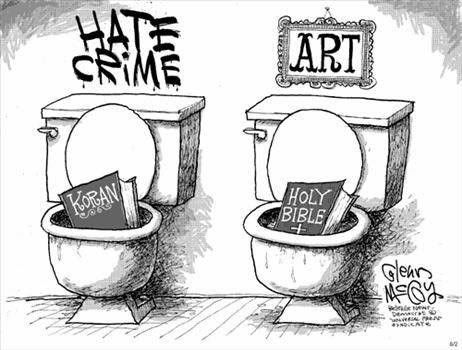(Heb. pesha')...Strong's #6588: This Hebrew word is derived from the verb pasha', which can mean "to revolt" (2 Kings 8:20), "to offend" (Prov. 18:19), or "to transgress" in the sense of crossing a boundary (Jer. 3:13). It refers to violations of God's law as revealed to Moses--in other words, someone crossing the limits that God had established...Like ancient Israel, we are in rebellion against God. In fact, it was "our transgressions" that wounded Jesus (Is. 53:5, 8; 1 Pet. 2:24).Compare this with the Quranic concept of limits as described in such verses as 2:173, 187, 190, 230; 9:112; 58:4; 65:1; and 78:22. This concept of "limits" was actually one of the very first things I noticed as I read the Quran for the first time.
Wednesday, March 26, 2008
Limits: a comparison
From page 202 of the NKJV Study Bible, the Word Focus box, on "transgressions":
Tuesday, March 25, 2008
Hadith
‘Hadith Malik 511:1588 The last statement that Muhammad made was: "O Lord, perish the Jews and Christians. They made churches of the graves of their prophets. There shall be no two faiths in Arabia.’
Labels:
hadith,
hate crimes,
jihad,
persecution
Comment on this, please
Labels:
art,
Bible,
defilement,
double standard,
hate crimes,
irony,
Koran,
quran
Friday, March 21, 2008
A few questions
Just to start out with, here are a few of my pressing questions for you (the rest of the blog will be about this too, but why not have a unique post about it?):
- Why is the Quran organized by sura length and not in chronological order? It seems to me that it would be much easier to understand if what was revealed first was written down first. After all, is Allah a god of order, or not?
- Since the Quran says, "O ye who believe! Ask not questions about things which if made plain to you, may cause you trouble. But if ye ask about things when the Quran is being revealed, they will be made plain to you, God will forgive those: for God is oft-forgiving, most Merciful.. Some people before you did ask such questions, and on that account lost their faith." (Sura 5:101-102), should I even be asking questions about Islam? If truth really does stand out clear from error, shouldn't questions strengthen one's faith? (I am not saying I am a Muslim. I am just asking the question.)
- Since the New Testament (by this I mean the four accounts of the life of Jesus Christ, the books on the early history of the Church, and the canonical epistles) came after the Old Testament (the Torah and the Prophets), we ought to judge it by what came before. In this way, Christians find out whether their God is being consistent and faithful or not. By similar logic (time alone), we should judge the Quran, revealed after the Old and New Testaments, by what came before. Indeed, the Quran itself exhorts us to do so. Indeed, even in fields like biology and geology, the past ought to be the key to the present. So, my question is, why is one supposed to judge the Bible by the Quran?
Labels:
chronology,
New Testament,
Old Testament,
questioning
Subscribe to:
Comments (Atom)


